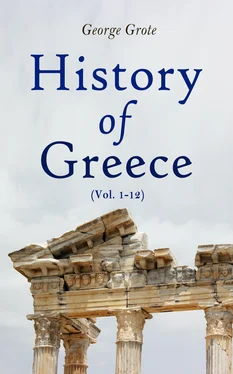George Grote - History of Greece (Vol. 1-12)
Здесь есть возможность читать онлайн «George Grote - History of Greece (Vol. 1-12)» — ознакомительный отрывок электронной книги совершенно бесплатно, а после прочтения отрывка купить полную версию. В некоторых случаях можно слушать аудио, скачать через торрент в формате fb2 и присутствует краткое содержание. Жанр: unrecognised, на английском языке. Описание произведения, (предисловие) а так же отзывы посетителей доступны на портале библиотеки ЛибКат.
- Название:History of Greece (Vol. 1-12)
- Автор:
- Жанр:
- Год:неизвестен
- ISBN:нет данных
- Рейтинг книги:5 / 5. Голосов: 1
-
Избранное:Добавить в избранное
- Отзывы:
-
Ваша оценка:
- 100
- 1
- 2
- 3
- 4
- 5
History of Greece (Vol. 1-12): краткое содержание, описание и аннотация
Предлагаем к чтению аннотацию, описание, краткое содержание или предисловие (зависит от того, что написал сам автор книги «History of Greece (Vol. 1-12)»). Если вы не нашли необходимую информацию о книге — напишите в комментариях, мы постараемся отыскать её.
History of Greece (Vol. 1-12) — читать онлайн ознакомительный отрывок
Ниже представлен текст книги, разбитый по страницам. Система сохранения места последней прочитанной страницы, позволяет с удобством читать онлайн бесплатно книгу «History of Greece (Vol. 1-12)», без необходимости каждый раз заново искать на чём Вы остановились. Поставьте закладку, и сможете в любой момент перейти на страницу, на которой закончили чтение.
Интервал:
Закладка:
These particulars, scanty as they are, possess a peculiar value, as the earliest authentic memorandum respecting the doing or suffering of any actual Greek person. There is no external testimony at all worthy of trust respecting the age of the “Works and Days:” Herodotus treats Hesiod and Homer as belonging to the same age, four hundred years before his own time; and there are other statements besides, some placing Hesiod at an earlier date than Homer, some at a later. Looking at the internal evidences, we may observe that the pervading sentiment, tone and purpose of the poem is widely different from that of the Iliad and Odyssey, and analogous to what we read respecting the compositions of Archilochus and the Amorgian Simonidês. The author of the “Works and Days” is indeed a preacher and not a satirist: but with this distinction, we find in him the same predominance of the present and the positive, the same disposition to turn the muse into an exponent of his own personal wrongs, the same employment of Æsopic fable by way of illustration, and the same unfavorable estimate of the female sex, 159all of which may be traced in the two poets above mentioned, placing both of them in contrast with the Homeric epic. Such an internal analogy, in the absence of good testimony, is the best guide which we can follow in determining the date of the “Works and Days,” which we should accordingly place shortly after the year 700 B. C. The style of the poem might indeed afford a proof that the ancient and uniform hexameter, though well adapted to continuous legendary narrative or to solemn hymns, was somewhat monotonous when called upon either to serve a polemical purpose or to impress a striking moral lesson. When poets, then the only existing composers, first began to apply their thoughts to the cut and thrust of actual life, aggressive or didactic, the verse would be seen to require a new, livelier and smarter metre; and out of this want grew the elegiac and the iambic verse, both seemingly contemporaneous, and both intended to supplant the primitive hexameter for the short effusions then coming into vogue.
CHAPTER III.
LEGEND OF THE IAPETIDS.
Table of Contents
The sons of the Titan god Iapetus, as described in the Hesiodic theogony, are Atlas, Menœtius, Promêtheus and Epimêtheus. 160Of these, Atlas alone is mentioned by Homer in the Odyssey, and even he not as the son of Iapetus: the latter himself is named in the Iliad as existing in Tartarus along with Kronos. The Homeric Atlas “knows the depths of the whole sea, and keeps by himself those tall pillars which hold the heaven apart from the earth.” 161
As the Homeric theogony generally appears much expanded in Hesiod, so also does the family of Iapetus, with their varied adventures. Atlas is here described, not as the keeper of the intermediate pillars between heaven and earth, but as himself condemned by Zeus to support the heaven on his head and hands; 162while the fierce Menœtius is thrust down to Erebus as a punishment for his ungovernable insolence. But the remaining two brothers, Promêtheus and Epimêtheus, are among the most interesting creations of Grecian legend, and distinguished in more than one respect from all the remainder.
First, the main battle between Zeus and the Titan gods is a contest of force purely and simply—mountains are hurled and thunder is launched, and the victory remains to the strongest. But the competition between Zeus and Promêtheus is one of craft and stratagem: the victory does indeed remain to the former, but the honors of the fight belong to the latter. Secondly, Promêtheus and Epimêtheus (the fore-thinker and the after-thinker 163) are characters stamped at the same mint and by the same effort, the express contrast and antithesis of each other. Thirdly, mankind are here expressly brought forward, not indeed as active partners in the struggle, but as the grand and capital subjects interested,—as gainers or sufferers by the result. Promêtheus appears in the exalted character of champion of the human race, even against the formidable superiority of Zeus.
In the primitive or Hesiodic legend, Promêtheus is not the creator or moulder of man; it is only the later additions which invest him with this character. 164The race are supposed as existing, and Promêtheus, a member of the dispossessed body of Titan gods, comes forward as their representative and defender. The advantageous bargain which he made with Zeus on their behalf, in respect to the partition of the sacrificial animals, has been recounted in the preceding chapter. Zeus felt that he had been outwitted, and was exceeding wroth. In his displeasure he withheld from mankind the inestimable comfort of fire, so that the race would have perished, had not Promêtheus stolen fire, in defiance of the command of the Supreme Ruler, and brought it to men in the hollow of a ferule. 165
Zeus was now doubly indignant, and determined to play off a still more ruinous stratagem. Hêphæstos, by his direction, moulded the form of a beautiful virgin; Athênê dressed her, Aphroditê and the Charities bestowed upon her both ornament and fascination, while Hermês infused into her the mind of a dog, a deceitful spirit, and treacherous words. 166The messenger of the gods conducted this “fascinating mischief” to mankind, at a time when Promêtheus was not present. Now Epimêtheus had received from his brother peremptory injunctions not to accept from the hands of Zeus any present whatever; but the beauty of Pandôra (so the newly-formed female was called) was not to be resisted. She was received and admitted among men, and from that moment their comfort and tranquillity was exchanged for suffering of every kind. 167The evils to which mankind are liable had been before enclosed in a cask in their own keeping: Pandôra in her malice removed the lid of the cask, and out flew these thousand evils and calamities, to exercise forever their destroying force. Hope alone remained imprisoned, and therefore without efficacy, as before—the inviolable lid being replaced before she could escape. Before this incident (says the legend) men had lived without disease or suffering; but now both earth and sea are full of mischiefs, while maladies of every description stalk abroad by day as well as by night, 168without any hope for man of relief to come.
The Theogony gives the legend here recounted, with some variations—leaving out the part of Epimêtheus altogether, as well as the cask of evils. Pandôra is the ruin of man, simply as the mother and representative of the female sex. 169And the variations are thus useful, as they enable us to distinguish the essential from the accessory circumstances of the story.
“Thus (says the poet, at the conclusion of his narrative) it is not possible to escape from the purposes of Zeus.” 170His mythe, connecting the calamitous condition of man with the malevolence of the supreme god, shows, first, by what cause such an unfriendly feeling was raised; next, by what instrumentality its deadly results were brought about. The human race are not indeed the creation, but the protected flock of Promêtheus, one of the elder or dispossessed Titan gods: when Zeus acquires supremacy, mankind along with the rest become subject to him, and are to make the best bargain they can respecting worship and service to be yielded. By the stratagem of their advocate Promêtheus, Zeus is cheated into such a partition of the victims as is eminently unprofitable to him; whereby his wrath is so provoked, that he tries to subtract from man the use of fire. Here however his scheme is frustrated by the theft of Promêtheus: but his second attempt is more successful, and he in his turn cheats the unthinking Epimêtheus into the acceptance of a present (in spite of the peremptory interdict of Promêtheus) by which the whole of man’s happiness is wrecked. This legend grows out of two feelings; partly as to the relations of the gods with man, partly as to the relation of the female sex with the male. The present gods are unkind towards man, but the old gods, with whom man’s lot was originally cast, were much kinder—and the ablest among them stands forward as the indefatigable protector of the race. Nevertheless, the mere excess of his craft proves the ultimate ruin of the cause which he espouses. He cheats Zeus out of a fair share of the sacrificial victim, so as both to provoke and justify a retaliation which he cannot be always at hand to ward off: the retaliation is, in his absence, consummated by a snare laid for Epimêtheus and voluntarily accepted. And thus, though Hesiod ascribes the calamitous condition of man to the malevolence of Zeus, his piety suggests two exculpatory pleas for the latter: mankind have been the first to defraud Zeus of his legitimate share of the sacrifice—and they have moreover been consenting parties to their own ruin. Such are the feelings, as to the relation between the gods and man, which have been one of the generating elements of this legend. The other element, a conviction of the vast mischief arising to man from women, whom yet they cannot dispense with, is frequently and strongly set forth in several of the Greek poets—by Simonidês of Amorgos and Phokylidês, not less than by the notorious misogynist Euripidês.
Читать дальшеИнтервал:
Закладка:
Похожие книги на «History of Greece (Vol. 1-12)»
Представляем Вашему вниманию похожие книги на «History of Greece (Vol. 1-12)» списком для выбора. Мы отобрали схожую по названию и смыслу литературу в надежде предоставить читателям больше вариантов отыскать новые, интересные, ещё непрочитанные произведения.
Обсуждение, отзывы о книге «History of Greece (Vol. 1-12)» и просто собственные мнения читателей. Оставьте ваши комментарии, напишите, что Вы думаете о произведении, его смысле или главных героях. Укажите что конкретно понравилось, а что нет, и почему Вы так считаете.












